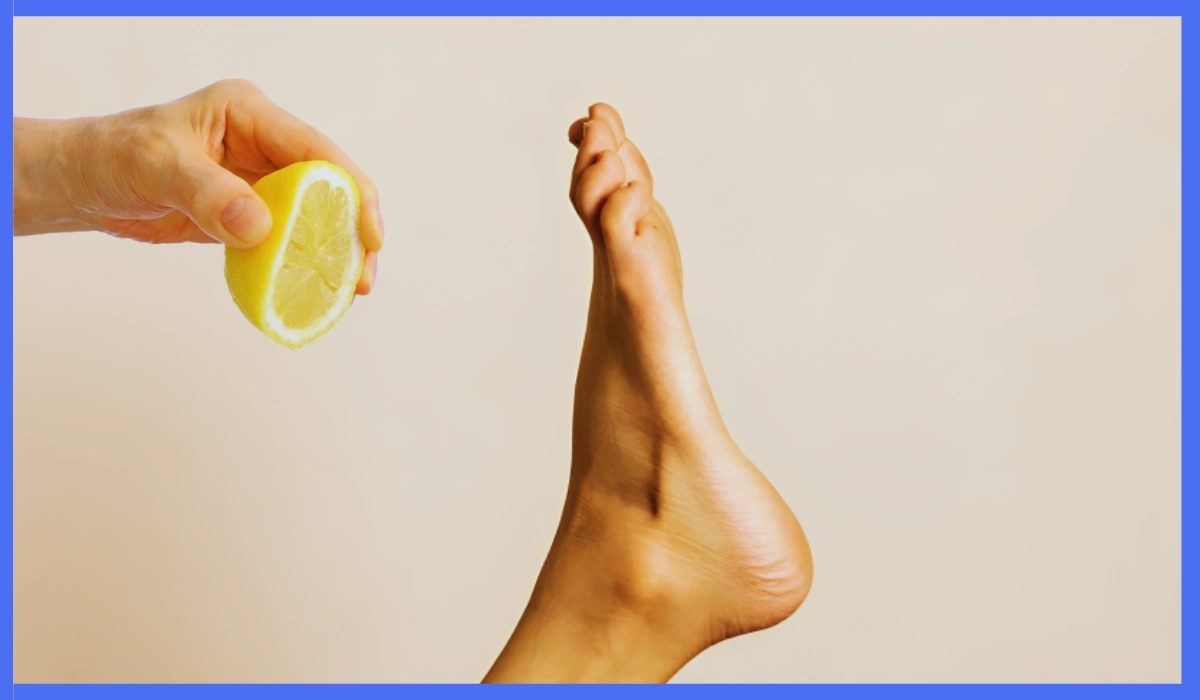Lemon Juice For Nail Fungus: Usage, Benefits, And More!
Onychomycosis, or nail fungus, can leave your nails looking and feeling bad. There are several over-the-counter and prescription therapies, but many individuals prefer natural remedies like lemon juice. What lemon juice can do for nail fungus, how it works, and how to apply it are covered in this article.

Disclaimer: This article has been generated with the assistance of AI tools. While our research team has fact-checked the content, readers should independently verify information for accuracy and reliability.
Nail fungus, or onychomycosis, can be an unsightly and uncomfortable condition that affects the appearance and health of your nails. While there are various over-the-counter and prescription treatments available, many people are turning to natural remedies like lemon juice as a safe and effective alternative. In this article, we’ll explore the potential benefits of using lemon juice for nail fungus, how it works, and how to use it effectively.
Understanding Nail Fungus

Nail fungus is a common condition that occurs when tiny microscopic organisms, typically dermatophytes, take up residence underneath the surface of the nail. These fungi thrive in warm, moist environments and can cause the nail to become discolored, thick, and brittle. Symptoms of nail fungus include yellow, brown, or white streaks on the nail, crumbly or ragged edges, and a chalky or distorted nail shape.
Several factors can increase the risk of developing nail fungus, including aging, poor circulation, weakened immune systems, and prolonged exposure to warm, moist environments. Individuals with certain medical conditions, such as diabetes or peripheral artery disease, are also more susceptible to nail fungal infections.
While nail fungus may seem like a cosmetic issue, it’s essential to treat it promptly. Left untreated, the fungus can spread to other nails or even the skin, leading to more severe complications and potentially causing pain or difficulty wearing shoes.
The Power Of Lemon Juice
Lemon juice is a natural remedy that has long been touted for its antifungal and antimicrobial properties. The citric acid found in lemons creates an acidic environment that inhibits the growth of fungi, making it an effective choice for treating nail fungus.
Using lemon juice for nail fungus can provide several potential benefits. First and foremost, the acidic nature of lemon juice can help reduce the discoloration and thickness of the affected nail, gradually improving its appearance. Additionally, the antifungal properties of lemon juice can prevent the spread of the fungus to other nails or surrounding skin.
As the fungal infection subsides, lemon juice can also promote the growth of healthy new nails, allowing the affected area to heal and regenerate. However, it’s important to note that while lemon juice is generally safe, some individuals may experience skin irritation or photosensitivity (increased sensitivity to sunlight) when using it topically.
How To Use Lemon Juice For Nail Fungus
If you’re interested in using lemon juice as a natural treatment for nail fungus, it’s essential to follow the proper application methods. Here’s a step-by-step guide:
- Start with a small area to test for potential skin reactions. Apply a small amount of lemon juice to a small section of your skin and wait 24 hours to ensure no adverse reactions occur.
- Once you’ve confirmed that lemon juice is safe for your skin, you can begin treating the affected nail(s). Using a fresh lemon, squeeze the juice directly onto a clean cotton ball or dropper.
- Gently apply the lemon juice to the affected nail(s), ensuring that the entire surface is covered. You may need to use multiple cotton balls or refill the dropper to cover larger areas.
- Allow the lemon juice to sit on the nail for approximately 30 minutes before rinsing it off with warm water.
- Repeat this process once or twice a day, depending on your preference and convenience.
To enhance the effectiveness of your lemon juice treatment, consider the following tips:
– Keep the affected area dry and clean between applications.
– Trim and file the affected nail(s) regularly to remove excess fungal growth and allow the lemon juice to penetrate better.
– Combine lemon juice with other natural remedies like tea tree oil or baking soda for added antifungal power.
Remember, consistency and patience are key when using lemon juice for nail fungus. It may take several weeks or even months to see a significant improvement, so it’s essential to stick with the treatment regimen.
Other Considerations and Precautions
While lemon juice can be an effective natural remedy for nail fungus, it’s essential to seek medical advice, especially for severe or persistent cases. Your healthcare provider can assess the severity of your condition and recommend additional treatments if necessary.
It’s also important to note that lemon juice should not be used as the sole treatment for nail fungus. For best results, consider combining it with other antifungal treatments, such as over-the-counter or prescription medications, as recommended by your healthcare provider.
Proper nail care practices can also aid in the treatment and prevention of nail fungus. Keep your nails trimmed and filed, wear breathable shoes, and avoid walking barefoot in public areas where fungi can thrive. Additionally, making lifestyle changes like maintaining good hygiene, managing underlying conditions like diabetes, and avoiding nail trauma can help reduce the risk of future fungal infections.
If you experience any adverse reactions, such as severe skin irritation or worsening of the condition, discontinue the use of lemon juice and consult a healthcare professional immediately.
Conclusion
Lemon juice can be an effective and affordable natural remedy for nail fungus, thanks to its antifungal and antimicrobial properties. By following the proper application methods and being consistent with the treatment, you may be able to reduce discoloration, thickness, and spread of the fungus, while promoting the growth of healthy new nails.
However, it’s important to remember that while lemon juice can be a useful tool in the fight against nail fungus, it may not work for everyone or in severe cases. If you don’t see satisfactory results after several weeks or months of consistent use, it’s advisable to explore other natural remedies or seek medical treatment.
Whether you choose to try lemon juice or opt for conventional treatments, taking proactive steps to address nail fungus is crucial for maintaining the overall health and appearance of your nails. So, why not give this natural remedy a try?

Lisa Miller
Dr. Lisa Miller is a board-certified Dermatologist with over 15 years of experience treating a wide range of skin, hair, and nail conditions. She received her medical degree from the prestigious Columbia University College of Physicians and Surgeons and completed her dermatology residency at the University of California, San Francisco, one of the top dermatology training programs in the country. Dr. Miller is an active member of the American Academy of Dermatology and has authored numerous peer-reviewed articles and book chapters on the latest advancements in dermatological care. She is frequently invited to speak at national and international medical conferences, sharing her expertise with other clinicians. In her private practice, Dr. Miller takes a patient-centered approach, collaborating closely with each individual to develop customized treatment plans. She is passionate about empowering her patients to achieve optimal skin, hair, and nail health through a combination of the latest medical therapies and lifestyle recommendations.
